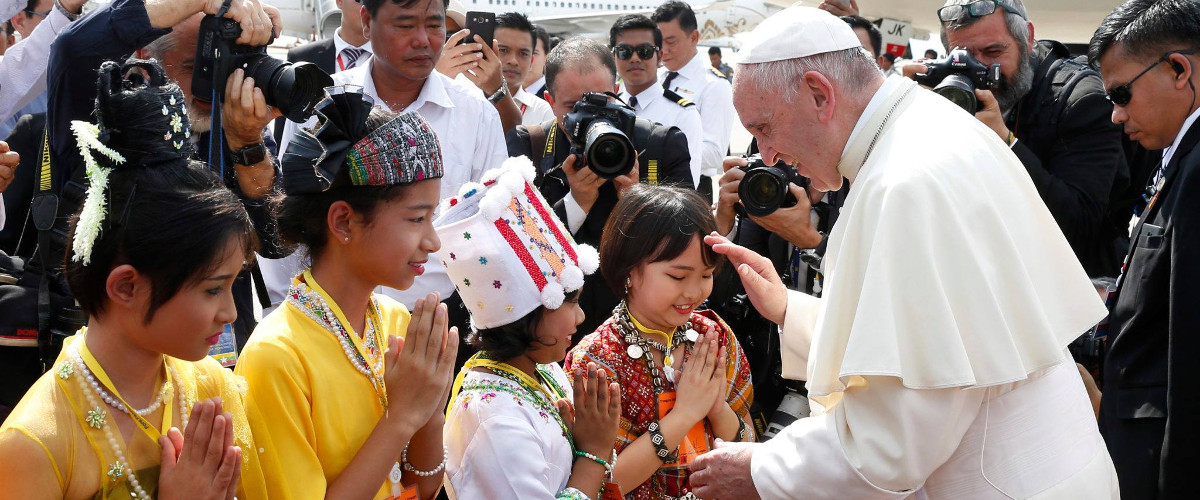 Rejoice with me, for I have found my sheep which was lost” says the shepherd in the parable of the lost sheep (Luke 15:6). Putting aside the question of whether Catholics in Myanmar can be compared to the lost sheep, the point of emphasis here is that the country has been lost for more than half a century under authoritarian regimes that have had little consideration for human rights including the basic right to religious freedom. Unknown to most people outside the country, Catholics, who make up just over one percent of Myanmar’s 52-million population, have been suffering silently “like a gentle lamb led to the slaughter” (Jer 11:19). They have lost lives, homes, schools and churches but not their faith, which is alive and thriving.
Rejoice with me, for I have found my sheep which was lost” says the shepherd in the parable of the lost sheep (Luke 15:6). Putting aside the question of whether Catholics in Myanmar can be compared to the lost sheep, the point of emphasis here is that the country has been lost for more than half a century under authoritarian regimes that have had little consideration for human rights including the basic right to religious freedom. Unknown to most people outside the country, Catholics, who make up just over one percent of Myanmar’s 52-million population, have been suffering silently “like a gentle lamb led to the slaughter” (Jer 11:19). They have lost lives, homes, schools and churches but not their faith, which is alive and thriving.
The visit of Pope Francis, the first Roman pontiff ever to visit the country, brought much joy and hope to the local Church. It had not imagined that a papal visit would be possible anytime soon. In fact, the invitation to the pope had come from the civil government elected into power in 2015 by the majority of the population, which is more than 80 percent Buddhist.
Coincidently, during the months of preparation to welcome the pope, the country faced more challenges such as armed conflicts and refugee crises in addition to its long-standing challenges of oppression, drug abuse and poverty. The pope himself said that the trip posed huge challenges but these had made him even more determined to make the trip. Perhaps it had been a great help to the government that he visited when the country was under a lot of unwanted pressure over its refugee crises. The happiest to welcome him, of course, were the Catholics who travelled from different parts of the country to see the pope in person and celebrate the Holy Eucharist with him.
For many of these pilgrims, the long journey was tiring and expensive but this was quickly forgotten once they were with the pope celebrating the mystery of God’s love together. It was truly a grace-filled moment of consolation with much religious enthusiasm. Relishing the experience that could also be seen as public recognition of their existence in the country, they hoped that his visit would bring about positive development especially in the areas of peace and justice that had been so very elusive for so long. It was a time when they felt the presence of the good shepherd who cared for his flock and searched for the least ones. Crucially, the public Mass was a concrete expression of the people’s faith in the Lord who would never leave them alone in need. Witnessing this had made me feel much energised as well.
As a local Jesuit who shares the same joy and sorrow of God’s people in the country, I believe the pope’s visit to be a sign that the same Lord is calling the Jesuits who bear His holy name to join Him in responding to the cries of the people. They have been crying out to God for help for more than half a century of suffering. For decades, the military authorities have violated their human dignity, forcing tens and thousands of them out of their homes, turning them into internally displaced persons or refugees in camps along the eastern border. To these and other least ones of society, the pope told us (the Jesuits in Myanmar) during our private meeting with him in the country, we must reach out like a shepherd who recognises both the “smell” of his sheep and the “smell” of God. In other words, we must discern the most appropriate ways to respond to the Lord’s call so that the needs of the broken hearted and those on the peripheries can be better fulfilled.
Finding how God wants us to respond to the immense needs of the people and living it out in reality has been a top priority for the Jesuits in the Myanmar Mission. Pope Francis emphasised the point I find most striking in his quotation from Pope Paul VI – “Wherever, at the crossroads of history, there are Jesuits. … Go to the crossroads. We must be men of prayer alive in the crossroads of history!”
I feel that we are right at the crossroads of history in my country, even unworthily resembling the crossroads experience of the first Jesuits. Their original dream of going to the Holy Land was made impossible by external reasons and they then chose to serve the Lord as Jesuits in the Church and gave witness to the Gospel through diverse ministries. Following their example, the Jesuits in Myanmar are striving to give witness to the joy of the Gospel in a country where the local Church and the majority of its citizens suffer silently under an authoritarian regime. Amidst the great needs of the people we serve, we endeavour to prioritise a few ministries over other possibilities in a realistic way so that our apostolic mission may also have certain depth underlying our quest for God’s greater glory.
Fr Wilbert Mireh SJ
Related story: Be deeply grounded, rooted in the love of God, says Pope Francis to Jesuits in Myanmar








